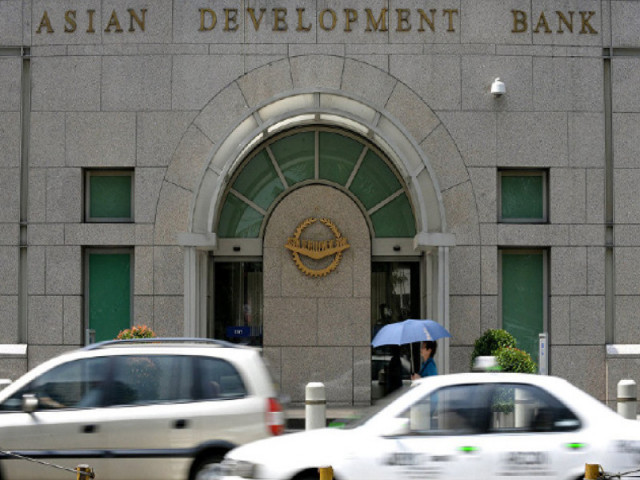ADB, donors pledge $5b in grants
Aim to combat climate change, poverty, gender gaps in member countries

The Asian Development Bank (ADB) and donors have pledged $5 billion in grants for member countries to combat vulnerabilities like climate change, natural disasters, poverty, and gender gaps over the next four years, enabling nations including Pakistan to focus on growth, development, and regional connectivity.
In a statement on Friday, the ADB said, “Donors and ADB have agreed to replenish $5 billion for ADB’s Asian Development Fund (ADF) 14 and Technical Assistance Special Fund (TASF) 8. The commitment was made during ADB’s 57th Annual Meeting.”
According to the bank, ADB President Masatsugu Asakawa said at a press conference, “This remarkable replenishment marks the largest ever commitment to ADF’s grant operations. It demonstrates ADF donors’ continued partnership with ADB to address the pressing development challenges of those most in need.”
The ADF is ADB’s largest source of grants for operations in its poorest and most vulnerable developing member countries and is replenished every four years. ADF 14, marking the 13th replenishment since the fund’s establishment, will support grant operations during 2025–2028.
The ADF 14 replenishment is about 22% higher than the $4.1 billion available in ADF 13 and will provide eligible ADB members with the largest-ever volume of ADF grants. TASF 8 will provide grants that help prepare projects, build capacity, and provide technical or policy advice.
Pakistan remains a top vulnerable country to climate change worldwide despite its less than 1% contribution to greenhouse gas emissions globally. It faced its worst situation in 30 years during the Summer 2022 floods, affecting 33 million people and inflicting more than $30 billion in damages and economic losses on the nation.
Pakistan would receive eligible grants through transformative projects among other initiatives. Additionally, Islamabad may also secure concessional loans, as the regional bank intends to provide $16.7 billion at very low interest rates over long repayment periods.
ADB President Masatsugu Asakawa further said, “Grants are more important than ever as our poorest and most vulnerable members seek to reverse recent development setbacks and take urgent action to combat the climate crisis.”
ADF 14 prioritises dedicated assistance to small island developing states that are particularly vulnerable, especially to climate change, and to countries in fragile and conflict-affected situations.
ADF 14 will continue to play a critical role in supporting climate change adaptation and disaster risk reduction. It will enable expanded assistance for regional cooperation and regional public goods, and for transformative gender action. It will also provide agile assistance in the event of emergencies through its crisis response window.
More than $2.5 billion, or 51%, of the replenishment will be funded by contributions from donors, including two new countries: Armenia and Georgia. ADB will significantly increase its net income transfers to ADF, from just under $1.2 billion in ADF 13 to almost $1.6 billion in ADF 14, an increase of 35%. The remaining $0.9 billion will comprise transfers from earlier ADF cycles and income from liquidity investments.
In parallel, ADB intends to provide $16.7 billion in concessional loans, which have very low interest rates over long repayment periods, during the ADF 14 period. Overall, ADB will be able to provide more than $8 in grants and concessional loans for every $1 in donor contributions.
ADB is committed to achieving a prosperous, inclusive, resilient, and sustainable Asia and the Pacific, while sustaining its efforts to eradicate extreme poverty. Established in 1966, it is owned by 68 members, 49 from the region.
The following donors announced contributions to ADF 14: Armenia; Australia; Austria; Canada; Denmark; Finland; France; Georgia; Germany; Hong Kong, China; India; Indonesia; Ireland; Italy; Japan; Luxembourg; Malaysia; Netherlands; New Zealand; Norway; People’s Republic of China; Philippines; Portugal; Republic of Korea; Spain; Sweden; Switzerland; Taipei, China; Türkiye; United Kingdom; and United States.
The following developing member countries are the primary recipients of grants from ADF 14: Federated States of Micronesia; Kiribati; Kyrgyz Republic; Maldives; Marshall Islands; Nauru; Samoa; Solomon Islands; Tajikistan; Tonga; Tuvalu; and Vanuatu. Grants will also be available to support the people of Afghanistan and Myanmar, and for transformative projects in Bangladesh; Bhutan; Cambodia; Cook Islands; Fiji; Lao People’s Democratic Republic; Mongolia; Nepal; Niue; Pakistan; Palau; Papua New Guinea; Sri Lanka; Timor-Leste; and Uzbekistan.
Addressing a press conference, ADB President Masatsugu Asakawa said, “We meet amidst multiple challenges that impact human and economic development, where progress has stalled for many. It is incumbent on us to intensify efforts to address the climate crisis, eradicate poverty, and foster inclusive socioeconomic development. The Asian Development Bank, alongside other multilateral development banks, plays a pivotal role in these efforts.”
“With this in mind, I am pleased to announce that yesterday we concluded the pledging session for the Asian Development Fund 14, or ADF 14. I am very grateful for the generous pledges from donors, which helped to deliver a replenishment of $5 billion.”
ADF 14 focuses on climate change adaptation, disaster risk reduction, promoting gender equality, and driving forward regional cooperation and integration, including regional public goods, he said.
ADF 14 remains ready to respond to disasters, health emergencies, and large cross-border displacements in a flexible manner.
“Our efforts will pave the way for a resilient, inclusive, and sustainable region, ensuring that the Asian Development Fund remains a powerful tool for change.”
Published in The Express Tribune, May 4th, 2024.
Like Business on Facebook, follow @TribuneBiz on Twitter to stay informed and join in the conversation.



















COMMENTS
Comments are moderated and generally will be posted if they are on-topic and not abusive.
For more information, please see our Comments FAQ